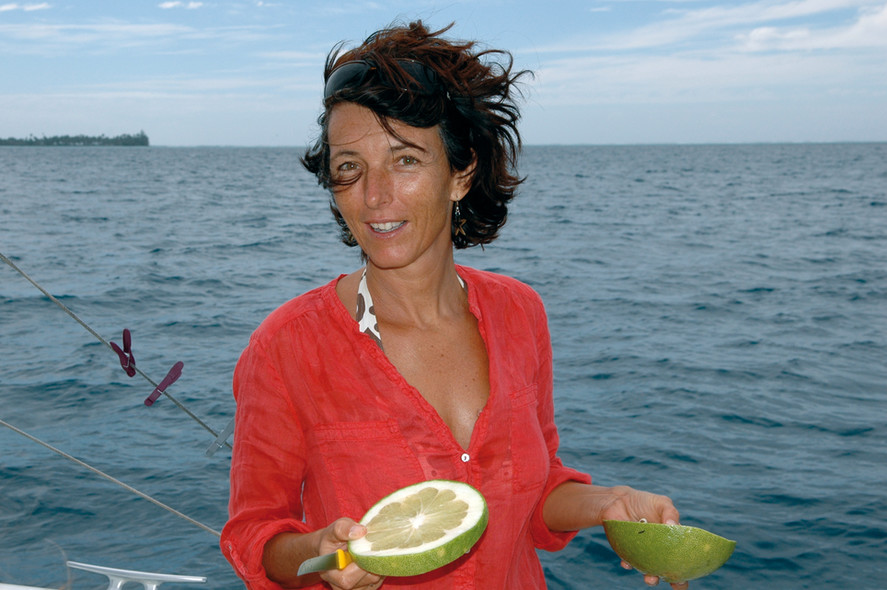
Issue #: 140
Published: March / April 2015
- Price per issue - digital : 5.40€Digital magazine
- Access to Multihulls World digital archives Digital archives
Olivier Mesnier is an experienced sailor, the boss of a boatyard, a merchant navy officer and an enlightened leisure sailor, who, along with his wife Barbara and his children, Marin and Adélie, sailed round the world aboard Jangada, a 53’ catamaran (‘Voyage Autour du Monde’ 2 volumes, March 2014).
Mindelo, Sao Vicente, Cape Verde, 24th May 2012: Jangada (the catamaran) was cruising off the archipelago. José, alone aboard his boat Magoër, is found at the foot of the companionway in a pool of blood, his skull smashed by blows from a winch handle. He had been attacked during the night by three individuals who stole his computer and a few tins of food!
CVD yacht wgnclub, Dakar:October 1982. The first Jangada was hauled out on the beach for 24 hours, on the club’s cradle. A Frenchman from the club said to me: “Take this (a 7.65 revolver) and get your boat back in the water as soon as possible.” The very same night, I found myself face to face with three individuals who had climbed aboard. I went out into the cockpit with the gun in my hand, and ordered the thieves to leave. The gun gleamed under the stars; I had my finger on the trigger. They ran away! CVD Dakar: 0300, 28th August 2009. Gérard was sleeping aboard his OVNI, with his partner. Three individuals entered the boat. Gérard was suffocated with a cushion until he was dead. His partner was savagely raped. The crooks left with a 12-volt television and 900 euros!
I hate conflict, I have never liked fighting, but in these cases, I think I would not have died. It’s not besmirching the memory of these unfortunates to say that they had no alternatives, no options! Death, for a few hundred euros, no way! Me, I want to have graduated options. Guns aboard: a tricky subject, on which it would be regrettable to be misunderstood. During our voyage, I wanted to have one, but I clearly separated the questions of having one and its use. Faced with adversity, I want to create opportunities; in certain regions of the world, the death of a westerner can be worth just a few tens of euros, the price of a watch or a cellphone. We can always dream of a better world! Far be it from me to advise everyone to have a gun aboard; that would be stupid. Me, I had one. A large caliber, six-shot revolver. It was a considered choice, which suited me alone. During our voyage, I was responsible for getting everyone back home safely. I never used my gun, and am glad of this. This approach suited my way of seeing things, my experience of life, and what I felt capable of, mentally, physically and morally. Another skipper, another crew, another story. The essential thing is to be capable of analyzing a risk situation quickly, to determine the best way to respond. I knew what the main risk was: naivety, meaning ignorance of the nature and extent of the danger. This is 90% of dealing with the situation in a positive way! Before embarking a firearm, I had thought carefully about the risk of an often fatal development (see the case of Peter Blake) brought about by the unsuitable defensive use of a weapon, faced with an assailant who is also armed, determined and without scruples.
The best weapons, in my opinion? Firstly, information, then an understanding of the situation, the ability to observe, and the absence of naivety. A teak cudgel, a speargun, a flare gun with explosive cartridges, a large caliber revolver are all appropriate accessories. You mustn’t expose yourself to danger stupidly; if despite everything you find yourself in a dangerous situation, the means employed must above all be dissuasive. The best weapon is certainly the one you are capable of using judiciously and effectively. For certain people, the best thing is not to have one. If the worst happens (attackers aboard with firearms), you must remain calm, above all not resisting, showing neither aggression or excessive fear, thinking only of preserving life. Be careful, obvious cowardice can also lead to death when faced with a predator. You must aim to initiate an exchange – ‘steal, but leave us alive’. If the attacker doesn’t have a firearm, the range of possibilities widens, on condition that you yourself have one! If an opportunity presents itself, you can try to grab it, but you must be sure of succeeding, or not do anything. I have studied Peter Blake’s story; Seamaster’s skipper seems to have committed a double error: he wanted to use a firearm, whilst his attackers (who were already aboard) were numerous and armed. He fired first, missing his target, and his rifle jammed. Peter had a courageous, but unsuitable attitude. Result: theft of a few watches and a motorized dinghy, which were quickly found! Yachts and their crews are particularly vulnerable faced with piracy; the best precaution is to avoid areas at risk, and to be well-informed. Nowadays, with the internet, it’s easy. Safety is quite often a question of intelligence; having a weapon aboard is a personal choice. Cruising round the world however remains less risky than driving to work via the freeway. During our round the world voyage, the most dangerous ocean in this respect was the Atlantic. Remember also: nothing is worth loss of life!
Muriel Andrey Favre was born in 1967. With her husband, Hervé, and their two children, they set off in 2008 aboard a Fusion 40 catamaran, for a sabbatical year in the Atlantic! They then accumulated the miles, until they arrived in Australia! They tell the story of their adventures in their book ‘Le Sillage des Favre en Mer, Kangaroo.’
I am not too scared of weapons. In Switzerland, there are lots of them, in almost every house – when considering the density of firearms, the country is in third position after the United States and the Yemen! Given that my son’s sport is the biathlon, I can even confirm that I know how to aim! It was during the construction of our catamaran that we broached the subject: should we create a special hiding place for a weapon, with a false-bottom to camouflage it? This question is one which you will be asked when you return from a long-term voyage. After ‘How long did you go for?’, and ‘Did you see any dolphins?’, you will without fail be questioned about pirates and safety! We deliberately chose not to have any weapons aboard Kangaroo, to avoid accidents and complications. If you have a weapon, you must know how (and dare) to use it. It must be quick to load and powerful, so as not to miss the target and frighten an attacker whilst you are shaking at the knees! It must therefore be in a place which is accessible, and out of reach of children or visitors. You must be certain you will have the courage to fire first in the case of a threat or attack, and this can quickly lead to disaster. A boat approaches, you start to be afraid, it’s night, instead of waiting and analyzing the situation, you go and look for your weapon, the tension increases a notch – do you fire to frighten them off? And if they fire back! Do you fire again? Or do you fire first, with the risk of hitting a poor fisherman who just wanted to sell you his catch, and spend the rest of your life in prison?
When you leave to go abroad in your boat, you must choose between two strategies: the first is to abide by the law. When you enter a country, you must therefore complete all the necessary declarations regarding the weapons, which will moreover almost always be confiscated! And there will be lot of paperwork, as well as lost time, to get them back again! The much-awaited weather window has arrived, but you can’t get your weapon back today as it’s a public holiday, or the official is ill! That’s no way to live! And then, news travels fast... “If they’ve given up their weapon, they no longer have the means to defend themselves!” If I was a pirate or a thief, I would therefore try to rob that boat first! The second technique is to declare nothing at all. But this adds a new source of anxiety, because if you are ever searched, and the customs or police discover your hiding place, will they lock you up for illegal possession? Having nothing is without a doubt the simplest solution. You don’t run any risk in the case of a search, and there will nevertheless remain a doubt: perhaps they have a weapon aboard? Aboard Kangaroo, we had a machete, used for opening coconuts or cutting up fish, a bow, which the children had made, as well as a box of nails which we could have spread on the sugar scoops when visiting disreputable places, so the intruders would hurt themselves and advertise their presence by their cries! Choose your anchorages carefully, listen to advice from the locals, open your eyes, feel the atmosphere. That’s why we go long-term cruising, isn’t it? For the encounters, the magic places, the calm, the freedom!


What readers think
Post a comment
No comments to show.